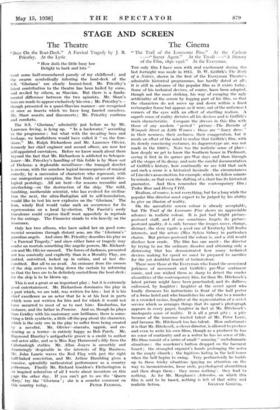The Cinema
" The Trail of the Lonesome Pine." At the Carlton —" Secret Agent." At the Tivoli—"A History of the Film, 1896-1936." At the Everyman.
THE only film I have seen with real excitement during the last fortnight was made in 1915. D. W. Griffith's The Birth of a Nation, shown in the first of the Everyman Theatre's admirable historical programmes, has hardly dated at all ; it is still in advance of the popular film as it exists today. Some of his technical devices, of course, have been adopted, though not the most striking, his way of escaping the ugly artificiality of the screen by fogging part of his film, so that the characters do not move up and down within a fixed rectangular frame but appear, as it were, out of the unfocussed corners of the eyes with an effect of startling realism. A superb sense of reality dictates all his devices and is Griffith's main characteristic. Compare the dresses in this film with those of any modern " period " picture—The Barrels of Wimpole Street or Little Women : those are " fancy dress " in their newness, their archness, their exaggeration, but it needs an effort of the mind to realise that Griflith's film, with its dowdy convincing costumes, its daguerrotype air, was not made in the 1860's. Note too the realistic sense of place : how deeply we get to know the Southern house in Piedmont, seeing it first in its spruce pre-War days and then through all the stages of its decay, and note the careful documentation of Griffith's history, how continually we are told that such and such a scene is a historical facsimile—the circumstances of Lincoln's assassination, for example, which we follow minute by minute, so that even the shifting of a chair has its historical guarantee. And then remember the contemporary filin : Tudor Rose and Henry VIII.
Realism, of course, is not everything, but for a long while the popular film director must expect to be judged by his ability to give an illusion of reality.
On the unrealistic screen colour is already acceptable, but The Trail of the Lonesome Pine shows no appreciable advance in realistic colour. It is just bad bright picture- postcard stuff, and if one sometimes forgets its picture- postcard quality, it is only because the images move, change, distract, the story (quite a good one of Kentucky hill feuds) interests, and the actors (Miss Sylvia Sidney in particular) charm. But picture-postcard the colour is, and a still would disclose how crude. The film has one merit : the director by trying to use the ordinary dissolve and obtaining only is distressing blur has demonstrated how many technical devices making for speed we must be prepared to sacrifice for the yet doubtful benefit of technicolour.
There were those at the Everyman who found the occasional jerkiness of movement and Griffith's pre-War sentiment comic, and one wished them as sharp to detect the cruder absurdities of the contemporary film, for then Mr. Hitchcock's latest picture might have been punctuated, and its dullness enlivened, by laughter : laughter at the secret agent who loudly discusses his instructions in front of the hall porter of a Swiss hotel and who brandishes his only clue to a murder in a crowded casino, laughter at the representation of a secret service which so arranges things that its agent's photograph appears in every paper, laughter in fact at Mr. Hitchcock's inadequate sense of reality. It is all a great pity ; a pity because of the immense wasted talent of Mr. Peter Lorre, and because Mr. Hitchcock too has talent. How unfortunate it is that Mr. Hitchcock, a clever-director, is allowed to produce and even to write his own films, though as a producer he has -no sense of continuity and as a writer he has no sense of life. His films consist of a series of small " amusing " melodramatic situations : the murderer's button dropped on the baccarat board ; the strangled organist's hands prolonging the notes in the empty church ; the fugitives hiding in the bell tower when the bell begins to swing. Very perfunctorily he builds up to these tricky situations (paying no attention on the way to inconsistencies, loose ends, psychological absurdities) and then drops them : they mean nothing : they lead to nothing. As for Mr. Maugham's Ashenden, on which this fihn is said to be based, nothing is left of that witty and






















































 Previous page
Previous page